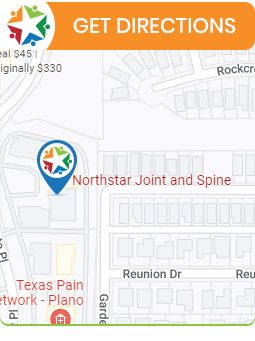Cervical Spondylosis Treatment Specialist in Plano, TX
Cervical spondylosis, caused by the degeneration of the neck’s spinal discs, can result in pain and stiffness. Dr. Robert J. Nocerini, MD, at Northstar Joint and Spine, provides treatment for cervical spondylosis aimed at reducing pain and improving range of motion. Through tailored treatment plans, our team helps patients manage symptoms and enhance their overall quality of life. For more information, contact us today or schedule an appointment. We are conveniently located at 7704 San Jacinto Pl Suite #200 Plano, TX 75024.




Table of Contents:
What is cervical spondylosis?
How common is cervical spondylosis?
What causes cervical spondylosis?
How can a pain management physician help with cervical spondylosis?
Relieve Cervical Spondylosis Symptoms with Dr. Robert J. Nocerini, MD in Plano, TX
Cervical spondylosis, which is also referred to as neck arthritis, is a degenerative condition that affects the cervical spine. This condition occurs due to the natural wear and tear that takes place on the cartilage and bones of the neck.
Cervical spondylosis can cause a variety of symptoms, including neck pain, stiffness, and a limited range of motion. As the condition progresses, it can lead to the development of bone spurs, herniated discs, or the narrowing of the spinal canal, all of which can put pressure on the spinal nerves. This pressure can cause radiating pain, tingling, numbness, and weakness in the arms, shoulders, and legs in severe cases.
Cervical spondylosis is relatively common, especially among older adults. As people age, the wear and tear on the cartilage and bones in the neck leads to the development of cervical spondylosis. A significant portion of people over the age of 60, and even some in their 40s and 50s, experience this condition to varying degrees.
The prevalence of cervical spondylosis tends to increase with age, making it a widespread issue among the elderly population. However, the severity of symptoms and progression of the condition vary on a case-by-case basis. Some people have mild discomfort or stiffness in their neck, while others experience more pronounced symptoms such as severe neck pain, radiating arm pain, and neurological symptoms like numbness and weakness. Proper pain management, including lifestyle adjustments, physical therapy, and other medical interventions, helps patients maintain an active and comfortable life despite the presence of cervical spondylosis.
This condition typically develops due to a combination of factors, with the primary cause being the natural aging process. Over time, the discs between the vertebrae in the neck lose moisture and elasticity. This leads to reduced cushioning in the spine, which increases its susceptibility to damage. This age-related degeneration is the foundation for cervical spondylosis. Several contributing factors can accelerate or worsen the condition, these include:
• Repetitive neck strain – Jobs and activities that involve repetitive neck movements or prolonged periods of poor posture increase the risk of cervical spondylosis.
• Genetic predisposition – Some people inherit a genetic predisposition to cervical spine problems, which makes them more susceptible to spondylosis.
• Obesity – Excess body weight often increases the stress on the cervical spine, which can accelerate its degeneration.
• Lack of physical activity – A sedentary lifestyle can weaken the muscles around the neck and promote the development of cervical spondylosis.
• Smoking – Smoking can lead to accelerated spinal disc degeneration, which can exacerbate this condition.
Understanding these causes and risk factors will allow you to take effective preventative measures such as lifestyle changes to reduce the risk and impact of cervical spondylosis.
Pain management doctors play an important role in helping patients suffering from cervical spondylosis regain their quality of life. These specialists are trained to provide comprehensive treatment to address the unique needs of each patient. Some ways pain management doctors assist cervical spondylosis patients include:
• Providing an accurate diagnosis – Pain management doctors begin by conducting a thorough evaluation. This includes a physical examination and may also involve diagnostic tests such as X-rays or MRI scans. This precise diagnostic process ensures that the treatment plan effectively targets the root cause of the pain.
• Performing interventional procedures – For severe cases or when conservative treatments aren’t sufficient, pain management doctors can administer minimally invasive techniques like cervical epidural injections or nerve blocks to relieve discomfort.
• Medication management – Pain management doctors can prescribe various medications, such as nonsteroidal anti-inflammatory drugs (NSAIDs) and muscle relaxants, to alleviate pain and reduce inflammation.
• Physical therapy – Pain management specialists collaborate with physical therapists to develop exercise and rehabilitation programs to improve neck strength and flexibility.
• Providing patient education – These physicians can educate patients on proper posture, ergonomics, and lifestyle modifications to prevent further degeneration and manage symptoms.
In summary, pain management physicians’ multidisciplinary approach aims to reduce pain, improve function, and enhance the wellness of patients living with cervical spondylosis. Our dedicated staff is here to help you take your first steps toward pain-free living.
Relieve cervical spondylosis symptoms with expert care from Dr. Robert J. Nocerini, MD, at Northstar Joint and Spine in Plano, TX. Dr. Nocerini, a board-certified pain management specialist with over 26 years of experience, offers advanced, non-surgical treatments tailored to each patient’s needs. Here’s how he can help:
• Comprehensive Diagnosis: Dr. Nocerini uses advanced diagnostic techniques to identify the severity of cervical spondylosis and any related nerve compression.
• Personalized Treatment Plans: Treatments are customized to target the root cause of your pain, whether it’s nerve compression, disc degeneration, or inflammation.
• Pain Management: Focused on reducing pain and restoring mobility, Dr. Nocerini uses evidence-based therapies to improve your quality of life.
• Long-Term Relief: Dr. Nocerini’s holistic approach ensures sustained pain management and helps prevent future flare-ups of cervical spondylosis symptoms.
Trust Dr. Nocerini’s expertise to help you regain comfort and movement without the need for surgery. For more information, contact us today or schedule an appointment. We are conveniently located at 7704 San Jacinto Pl Suite #200 Plano, TX 75024. We serve patients from Plano TX, Willow Bend TX, Frisco TX, Allen TX, Addison TX, North Dallas TX, and surrounding areas.

Check Out Our 5 Star Reviews


Additional Services You May Need
▸ Back Pain
▸ Shoulder Pain
▸ Chronic Pain
▸ Epidural Steroid Injections
▸ Spinal Cord Stimulation
▸ Viscosupplementation
▸ Genicular Nerve Blocks
▸ Facet Injections
▸ Joint Injections
▸ Sacroiliac Joint Injections
▸ Lumbar and Cervical
▸ Facet Medial Branch Blocks
▸ Diagnostic Nerve Blocks
▸ Medication Management
▸ Neck Pain Doctor
▸ Diabetic Peripheral Neuropathy
▸ Headaches
▸ Suboxone
▸ Peripheral Nerve Stimulation
▸ Spine
▸ Joints
▸ Muscles
▸ Bones

Additional Services You May Need
▸ Back Pain
▸ Shoulder Pain
▸ Chronic Pain
▸ Epidural Steroid Injections
▸ Spinal Cord Stimulation
▸ Viscosupplementation
▸ Genicular Nerve Blocks
▸ Facet Injections
▸ Joint Injections
▸ Sacroiliac Joint Injections
▸ Lumbar and Cervical
▸ Facet Medial Branch Blocks
▸ Diagnostic Nerve Blocks
▸ Medication Management
▸ Neck Pain Doctor
▸ Diabetic Peripheral Neuropathy
▸ Headaches
▸ Suboxone
▸ Peripheral Nerve Stimulation
▸ Spine
▸ Joints
▸ Muscles
▸ Bones






